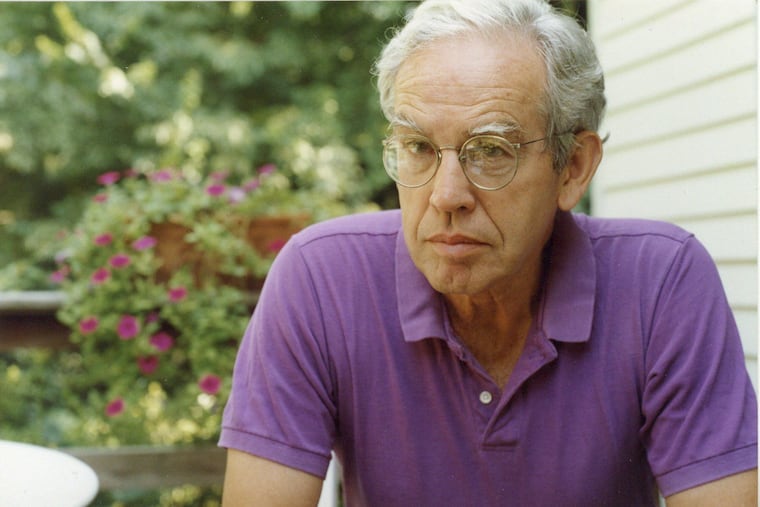Robinson G. Hollister Jr., longtime Swarthmore College economist known for groundbreaking evaluation of public policy efforts, dies at 86
Robinson G. Hollister Jr. conducted groundbreaking work in using randomized trials to evaluate social policies, designed much like clinical drug trials where some got treatment and others didn’t.

Robinson G. Hollister Jr., 86, a noted economist and Swarthmore College professor who designed and conducted the first large-scale social policy evaluation involving random trials, died Sept. 14 after complications from a fall in Needham, Mass.
Mr. Hollister was a professor for more than four decades at Swarthmore, where he started a public policy program and taught labor and social economics and econometrics. He was an expert in poverty, welfare reform, health care, and the effectiveness of job training, and he conducted groundbreaking work in using randomized trials to evaluate social policies, designed much like clinical drug trials where some got treatment and others didn’t. He served as an adviser to agencies and governments around the world and ultimately worked in more than 40 countries during his career.
He is perhaps best known for his design of the New Jersey Negative Income Tax Experiment after joining the U.S. Office of Economic Opportunity in 1966 as a staff economist during its War on Poverty effort. Under that experiment, people were given cash assistance to bring them to a certain income level, while others were not, and the impact was studied. The tax experiment ultimately was not adopted but paved the way for other social policy evaluations using random trials.
“For Rob, economics was not about theory but about using insights from economics to inform public policy so that it could improve people’s lives,” said Ellen Magenheim, a professor of economics at Swarthmore. “This commitment was at the core of his teaching and all other aspects of his professional life.”
The work was regarded with some skepticism early on but came to be widely accepted, and in 2019, the Nobel Prize in economics went to economists who used this method.
“His persistence and logic won out,” said John Caskey, also a Swarthmore professor of economics.
Growing up in Glen Ridge, N.J., Mr. Hollister became interested in economics after writing an essay on agricultural subsidies that won a newspaper contest. He majored in economics at Amherst College and later got his doctorate at Stanford University, with his international consulting career already underway. Before Swarthmore, he taught at Williams College and the University of Wisconsin.
An avid swimmer all his life, he became the New England champion in backstroke in college and was in the Swarthmore Swim Club’s 1,000 Lap Club.
“The joke was he chose to go to Amherst because it had a nice swimming pool,” said his daughter Matissa Hollister, an assistant professor of organizational behavior at McGill University in Montreal.
Both her father and mother gave their children every opportunity, and Mr. Hollister kept a journal where he wrote how proud he was to hear from teachers that his daughters were kind and welcomed other kids to the classroom, she said. The family lived in Malaysia, France, New York City, and Berkeley during his research sabbaticals. Matissa Hollister followed in her father’s footsteps, and when she was a doctoral student at Harvard, he came and spent a sabbatical in the same research office where she was studying.
Known for his professorial attire of shorts and Birkenstocks, Mr. Hollister was as passionate about his teaching as he was about his research, and over the years, his students came back repeatedly to thank him, even in the weeks before his death.
One student came to visit in August after she found out he wasn’t doing so well, driving “across Massachusetts, three hours in each direction, to see him,” said daughter Arusha Hollister, a curriculum developer from Boston.
Her father always sought to connect his children and his students with others who could help them in their career, she said, and encouraged students to go into public policy.
Asked during Donald Trump’s presidency what useful advice he would give a Swarthmore economics major, he said in a Q&A: “Think seriously about a career in public policy because you can really make a big contribution. ... The Trump Administration has fired or driven out so many capable people and really emptied out key parts of the administration. I think, when his term is over, there is going to be an opportunity to start something new and make a real impact.”
Though he retired in 2015 at age 80 and moved to the Boston area to be closer to one of his daughters, he continued to share his vast knowledge, giving presentations in his retirement community up until a couple years ago, Arusha Hollister said. He also played his harmonica and sang songs in the hallways and participated in an intergenerational chorus with her and her children.
In addition to his daughters, Mr. Hollister is survived by his wife of 57 years, Valerie, an artist whom he met at Stanford; and two grandchildren. The family is planning a service on Zoom at 10 a.m. on Saturday, Oct. 23. For information, contact m73hollis@yahoo.com.
The family asks that gifts be directed to the Robinson G. Hollister Summer Opportunity fund at gift.swarthmore.edu by choosing “other” and entering the fund name.